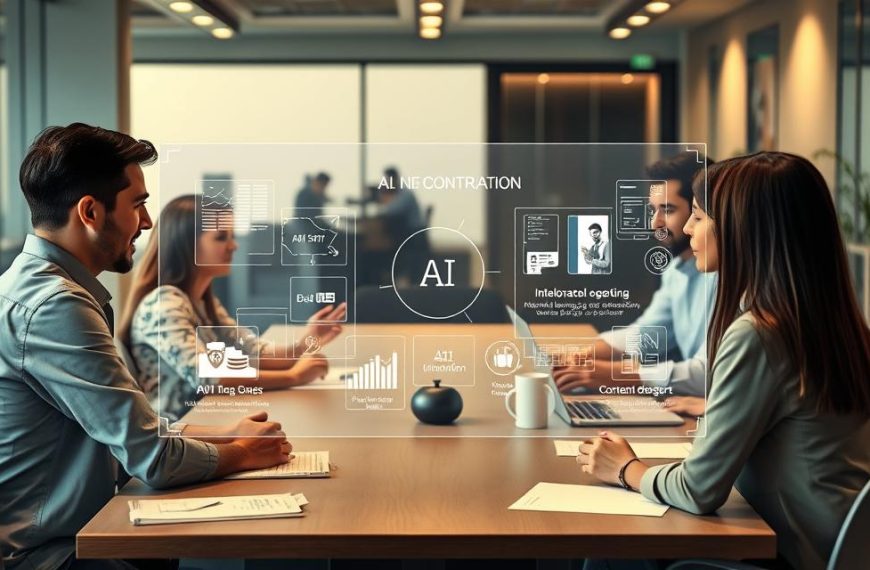AI is reshaping how companies operate and compete in modern technology. Business leaders are boosting investments in AI and machine learning. This shift shows AI’s growing importance in tech strategies.
AI goes beyond simple automation in business. It can transform decision-making and boost productivity. AI also offers deep insights into customer behaviour.
Modern tech with AI creates new competitive edges. These include predictive analytics and personalised marketing.
Experts predict AI will add £12.5 trillion to the global economy by 2030. This growth shows AI’s power to drive innovation across many sectors.
AI is changing traditional business models. It’s also creating new chances for strategic growth.
Amazon and Netflix show AI’s amazing potential in business. AI-driven strategies generate 35% of Amazon’s revenue through smart cross-selling.
As more companies use AI, business is becoming smarter. The future of business looks more adaptive and data-driven.
Understanding Artificial Intelligence in Modern Business
AI has revolutionised business technology, offering unmatched capabilities across various sectors. It goes beyond simple automation, representing a system of intelligent algorithms. These algorithms can learn, adapt, and make complex decisions.
Businesses are quickly realising AI’s potential. However, recent statistics show a gap in AI adoption and understanding.
- Only 10% of small businesses with up to 24 employees know how to use AI for work-related tasks
- 67% of small business owners admit knowing little about AI
- 40% of global employment is exposed to potential AI integration
Core Components of Business AI
Business AI comprises several key technological elements. These drive intelligent system performance and enhance business operations.
- Machine Learning: Algorithms that improve through experience
- Natural Language Processing: Understanding and generating human language
- Data Analytics: Extracting meaningful insights from complex datasets
Evolution of AI Technologies
AI has progressed from basic rule-based systems to complex neural networks. This evolution has opened new possibilities for businesses.
Today, companies use AI to:
- Automate repetitive tasks
- Generate innovative business strategies
- Process massive data volumes rapidly
The global AI market is booming, with a 40.2% annual growth rate. It’s currently valued at $62 billion, signalling a tech revolution.
Key Functions of AI in Business Operations
AI is changing how businesses work at a rapid pace. Most leaders believe it’s crucial for success. Operational AI has become a game-changer across many industries.
AI apps are changing key business tasks with clever abilities. They automate routine thinking jobs and offer deep strategic insights. AI also improves decision-making and boosts operational efficiency.
Companies use AI to make big improvements. AI tools can cut forecasting errors by half. They can also reduce lost sales from low stock by 65%.
“AI is not just a futuristic concept, but a present-day tool driving innovation and competitive advantage.” – Tech Innovation Quarterly
AI has many practical uses. These include supply chain management and customer service. It’s also used for predictive maintenance and quality control.
IBM saved $160 million using AI during tough times. A mining firm cut downtime by 30% with AI-driven maintenance. An AI visual check system found 97% of defects accurately.
As firms keep using smart tech, AI will become vital for modern business plans.
Why is Artificial Intelligence Important to Business Applications of Technology
Artificial intelligence revolutionises modern business technology applications. It’s a crucial tool for gaining a competitive edge and driving organisational success. Business leaders recognise AI’s pivotal role in reshaping operations and strategic decision-making.
AI’s strategic importance in business is undeniable. Recent studies reveal compelling insights into its potential:
- 84% of C-suite executives believe AI is crucial for achieving growth objectives
- Companies scaling AI see 3X returns on their investments
- 75% of executives believe failing to adopt AI could risk business survival
Data Processing and Analysis Capabilities
AI’s data processing capabilities outshine traditional analytical methods. Machine learning algorithms analyse massive datasets with unprecedented speed and accuracy. This transforms raw information into actionable insights.
Businesses using AI can process complex data streams effortlessly. They identify patterns that human analysts might miss.
Enhanced Decision-Making Processes
“AI provides near-instantaneous monitoring capabilities to detect unusual activity, mitigating risks proactively.” – Industry Expert
AI integration dramatically improves decision-making. Predictive analytics enable precise forecasting of market trends, customer behaviours, and potential risks. This reduces human error and provides data-driven recommendations.
AI empowers businesses to make more informed strategic choices. It offers a level of insight previously unattainable.
Competitive Advantage Through AI Integration
| AI Application | Business Impact | Productivity Gain |
|---|---|---|
| Automation | Reduced Operational Costs | Up to 70% Time Savings |
| Customer Insights | Personalised Experiences | Enhanced Satisfaction Rates |
| Predictive Analytics | Risk Mitigation | Proactive Decision Making |
Companies that integrate AI technology become industry innovators. They unlock new opportunities and streamline operations. This creates sustainable competitive advantages in our increasingly digital marketplace.
AI-Driven Business Transformation Across Industries
AI is reshaping how businesses operate across diverse sectors. From healthcare to finance, it’s creating new opportunities for innovation and efficiency. This transformation is revolutionising traditional approaches in various industries.
AI’s impact spans multiple critical industries, showing remarkable versatility. Its applications are transforming organisational capabilities in healthcare, finance, manufacturing, and retail.
- Healthcare: AI enables personalised treatment plans and accelerates drug discovery processes
- Finance: Algorithmic trading and advanced fraud detection systems
- Manufacturing: Predictive maintenance and quality control mechanisms
- Retail: Intelligent inventory management and personalised customer recommendations
McKinsey reports that AI could add $13 trillion to the global economy by 2030. This highlights the profound potential of intelligent technologies in various sectors.
“AI is not just improving existing processes but fundamentally reimagining how businesses create value.” – AI Research Institute
Companies using AI-driven platforms can optimise operations and enhance customer experiences. They can also drive strategic decision-making more effectively. Ride-sharing apps, for example, use AI to adjust routes and pricing in real-time.
The future belongs to data-driven, AI-first organisations. These companies can rapidly innovate and respond to market demands. Already, 65% of businesses use generative AI.
Moreover, 67% of companies plan to increase their AI investments. This clearly shows that the technological revolution is well underway.
Strategic Implementation of AI in Business Functions
AI is changing how businesses handle important tasks. Only 7% of companies use AI for strategic planning. This leaves room for growth in many areas of business operations.
AI implementation can boost efficiency and innovation. It can also give businesses an edge over competitors. The potential for transformation across organisations is enormous.
AI adoption varies across different business areas. Let’s explore some key insights:
- Marketing and customer engagement show 25-30% AI adoption rates
- Process automation capabilities are dramatically improving decision-making speeds
- Human resources functions are being streamlined through intelligent technologies
Marketing and Customer Engagement
AI has revolutionised marketing strategies. Companies can now target ads with incredible accuracy. They analyse customer browsing habits to create personalised experiences.
AI chatbots offer round-the-clock customer service. They solve problems and suggest products more efficiently than traditional methods.
Operations and Process Automation
Process automation is a vital AI strategy. Businesses can now analyse complex scenarios 20 times faster than before. This speed boost applies to various areas.
From supply chain optimisation to quality control, AI enables quick, data-driven decisions. These were previously impossible to make.
Human Resources and Talent Management
AI is reshaping talent acquisition and management. Advanced algorithms can screen candidates and predict employee performance. They can also spot potential skill gaps in the workforce.
Companies like PepsiCo have already implemented AI-driven recruitment tools that significantly reduce hiring times and improve candidate selection.
AI is not about replacing humans, but empowering them to work more intelligently and effectively.
Security and Risk Management Through AI
AI security is a vital shield against sophisticated cyber threats in our rapidly changing digital world. It’s a crucial tool for organisations seeking strong risk management strategies. Cybersecurity AI helps protect digital assets in complex tech environments.
AI-powered security solutions offer impressive capabilities in threat detection and prevention. They provide real-time threat identification and automated vulnerability scanning. These tools also offer predictive risk assessment and continuous security monitoring.
- Real-time threat identification
- Automated vulnerability scanning
- Predictive risk assessment
- Continuous security monitoring
IBM’s Cost of a Data Breach Report reveals fascinating insights about AI’s impact on cybersecurity. Organisations using AI security tools can spot and contain data breaches 108 days faster than traditional methods. This speed leads to significant savings, with firms cutting data breach response costs by USD 1.76 million on average.
The AI security market is growing rapidly. It was worth USD 20.19 billion in 2023. Experts predict it will reach USD 141.64 billion by 2032. This growth shows how crucial AI is for risk management across industries.
AI is not just a technology—it’s a vigilant guardian continuously learning and adapting to emerging digital threats.
AI in cybersecurity offers several key advantages. These include enhanced threat detection accuracy and reduced human error. It also provides automated patch management and intelligent identity and access management.
- Enhanced threat detection accuracy
- Reduced human error
- Automated patch management
- Intelligent identity and access management
AI security brings great benefits, but organisations must be aware of potential challenges. These include algorithmic bias and the need for high-quality input data. The future of cybersecurity relies on smart, adaptive systems that can predict and stop threats early.
Future Trends and Innovations in Business AI
AI innovations are swiftly changing business landscapes. Organisations are set for major tech shifts. With 55% of businesses using AI, digital transformation is speeding up.
AI’s potential spans multiple sectors. It could speed up scientific research tenfold. This means 50 to 100 years of progress in just 5 to 10 years.
Quantum computing and edge AI are emerging as game-changers. They’ll reshape how businesses use smart systems.
AI investment options are growing and appealing. Healthcare, finance, and tech sectors are seeing big AI-driven changes. Demand for machine learning experts is rising.
Human-AI teamwork will drive unmatched innovation. Businesses using AI are embracing a new approach to problem-solving. The next decade will likely reshape workplace dynamics.
Emerging Technologies and Applications
Quantum computing and advanced neural networks expand AI’s abilities. Google and IBM are leading breakthrough tech that will redefine computing power.
Predicted Market Evolution
The AI market is set for huge growth. Projections show massive changes across industries. Businesses investing in AI will likely gain big competitive edges.
Investment Opportunities
Strategic AI investments will be key for staying competitive. Healthcare, financial tech, and machine learning offer promising investment chances.











